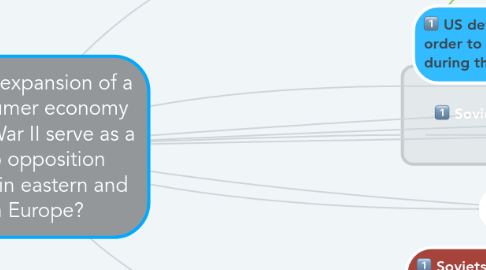How did the expansion of a global consumer economy after World War II serve as a catalyst to opposition movements in eastern and western Europe?
by Tea Bone

1. Soviet Collapse
1.1. Khrushchev tried to reform the Communist party, but many saw him and his actions as ineffective.
2. Soviet isolation
3. Western Boom
3.1. US experiences economic growth, expands and develops at an unprecedented rate.
3.2. US develops more nuclear weapons and stockpiles them, making rivals nervous.
3.3. Because of support from US, Western Europe is able to rebuild themselves much faster than the east. Leading to anger between the two.
4. US and USSR tension bleeds into other nations.
4.1. Cuban Missile Crisis
4.2. US military presence in Turkey, causes strife between US and USSR and the USSR and Turkey.
5. These moves increased paranoia and hostilities between the two. Hope for peace fell even further to the wayside.
6. US develops NATO with allies in order to support each other during the rebuild.
6.1. NATO is also used as a show of unity and power against the USSR.
7. Soviets sign Warsaw Pact with other Soviet Bloc nations, signifying their resistance to the US's own movements.
8. Europe was split between the US and USSR, taking sides in the conflict. Further widening the divide between East and West.
8.1. Eastern nations were Communist, the West was Capitalist and more Democratic.
8.2. Each side demonized the other. Propaganda and fear mongering spread across continent.
9. Eastern and Western Europe developed differently during this period.
9.1. Because US helped the West, they recovered and prospered quicker, new roads, better technologies, more civil liberties. Their economies regrew and blossomed.
9.2. After the fall of the USSR, Eastern Europe was mostly stuck in the past, years of oppression and lack of resources left them with poor infrastructure and the inability to rebuild and govern effectively.


